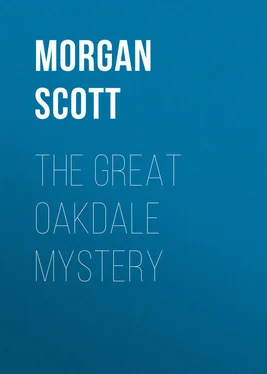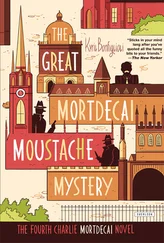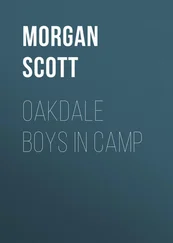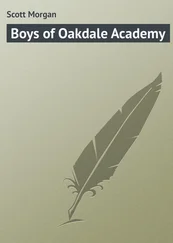Morgan Scott - The Great Oakdale Mystery
Здесь есть возможность читать онлайн «Morgan Scott - The Great Oakdale Mystery» — ознакомительный отрывок электронной книги совершенно бесплатно, а после прочтения отрывка купить полную версию. В некоторых случаях можно слушать аудио, скачать через торрент в формате fb2 и присутствует краткое содержание. Жанр: Классический детектив, foreign_detective, foreign_prose, на английском языке. Описание произведения, (предисловие) а так же отзывы посетителей доступны на портале библиотеки ЛибКат.
- Название:The Great Oakdale Mystery
- Автор:
- Жанр:
- Год:неизвестен
- ISBN:нет данных
- Рейтинг книги:3 / 5. Голосов: 1
-
Избранное:Добавить в избранное
- Отзывы:
-
Ваша оценка:
- 60
- 1
- 2
- 3
- 4
- 5
The Great Oakdale Mystery: краткое содержание, описание и аннотация
Предлагаем к чтению аннотацию, описание, краткое содержание или предисловие (зависит от того, что написал сам автор книги «The Great Oakdale Mystery»). Если вы не нашли необходимую информацию о книге — напишите в комментариях, мы постараемся отыскать её.
The Great Oakdale Mystery — читать онлайн ознакомительный отрывок
Ниже представлен текст книги, разбитый по страницам. Система сохранения места последней прочитанной страницы, позволяет с удобством читать онлайн бесплатно книгу «The Great Oakdale Mystery», без необходимости каждый раз заново искать на чём Вы остановились. Поставьте закладку, и сможете в любой момент перейти на страницу, на которой закончили чтение.
Интервал:
Закладка:
Suddenly, as if becoming aware that someone was near who had no right to be there, the dog barked in the room below. Immediately the man drew hastily back from the border of light and retreated into the darkness.
In a twinkling Fred Sage was leaping into his clothes. The dog, quieted by a word from Mr. Sage, did not bark again. The deep darkness beneath a tree near the house had enfolded the man.
Fred did not strike a light. With his hastily donned clothes barely clinging to him, he caught up a pair of rubber-soled “sneakers,” thrust his feet into them, opened the door of his room quickly but quietly, and crept down the stairs. He could hear his father and mother talking, but they did not hear him as he turned the key in the lock of the door and let himself out.
Quivering with excitement, the boy reached the corner of the house and peered round it. He could see no one, although the tree beneath which the man had vanished was only a short distance away.
“If I can find him, I’ll demand to know what business he has around here,” thought Fred. “If mother knew, she’d be badly frightened.”
Summoning all his courage, he stepped out boldly and advanced toward the tree, but when he reached it there was still no living creature to be seen.
Twice Sage circled the buildings without result, and he became satisfied that the unknown had lost no time in departing.
“But it’s mighty queer,” he muttered – “mighty queer. I don’t understand it. Perhaps I ought to tell father, but if I do I know mother won’t sleep to-night.”
Silently though he reentered the house, Spot barked again, and Fred’s father opened the door into the hall.
“Just stepped outdoors for a minute,” said the boy. “It’s going to be a good day to-morrow, I think.”
“Oh, is it you?” said Mr. Sage. “Spot barked, and your mother thought he heard something. We had an idea you were abed.”
“I’m going now. Good-night. Good-night, mother.”
“Good-night, Fred,” called his mother in response, and Mr. Sage closed the door.
For more than half an hour Fred watched from his unlighted window. He heard his parents retire, and the light no longer shone forth from the sitting-room. His eyes had become accustomed to the darkness and he could see certain objects in the vicinity of the house, but they were all familiar objects, and amid them no strange shadow moved.
“I’ll have to tell father and mother to-morrow,” decided the boy, as he finally got into bed.
Again and again during the night he dreamed of the mysterious stranger, and once he awoke panting from a terrific hand-to-hand struggle with the man. It brought him up to gaze once more from the window, through which came the chill air of the autumn night.
“I’m a fool,” he whispered, his teeth chattering with the cold. “I’m going to sleep now, and see if I can’t dodge those silly dreams. Confound Sleuth Piper, anyhow! Still, I’d like to know what that man was doing here.”
CHAPTER VI.
CAPTAIN QUINN’S MONKEY
Fred’s parents were regular church attendants, and Fred himself rarely failed to appear with them at morning service on the Sabbath day. It must be regretfully confessed that church had little attraction for many of the youths of Oakdale, and among those who seldom sat through a sermon was Roy Hooker.
Roy, however, was waiting on the sidewalk in front of the church when Fred came out. It was a mild, sunny day, and the outside world looked most attractive. In response to a covert signal from Hooker, Sage joined him.
“Come for a walk, old man,” invited Roy. “Gee! you must be dopey, sitting in that dark old church and listening to a dry sermon.”
“I did get a bit sleepy,” Fred confessed. “You’re not going to walk far, are you?”
“Oh, you can suit yourself about that. What time do you have dinner?”
“Around two o’clock.”
“That will give us a couple of hours. It’s mighty pokey loafing around all day Sunday, with nothing for amusement. If you’d only go gunning – ”
“Not on the Sabbath. Too many fellows do that around here.”
Fred’s parents had lingered to exchange a few words with some friends, and as they finally came down the walk he told them he was going for a short stroll with Roy.
“Be home to dinner, surely,” urged his mother.
He promised, and set off with Hooker, turning down the street. At the square, in the center of the village, they turned on to Lake Street and proceeded eastward, passing the new bank, a small, square building of brick and stone.
“That makes a great improvement on this street,” commented Fred.
“Oh, yes,” nodded Hooker; “but it would have looked better had they been able to purchase that little old hut and the land belonging to Aaron Quinn. That shanty, squatting right there almost under the rear eaves of the bank, is a regular eyesore, but I understand old Quinn refused to sell at any price.”
The building in question was a tiny old house that stood some distance from the street, partly hidden by two large oak trees and a straggling growth of lilac bushes. It was sorely in need of repairs and paint, and some of the broken windows had been patched or stuffed with rags.
Aaron Quinn, the owner of this disreputable little shanty, was a surly, blustering old sea captain, who had given up his calling on account of age and rheumatism and returned to spend the latter days of his life at his birthplace in Oakdale. His irascible temper and general crabbedness made him more or less unpopular among the villagers, and especially so with the boys of the town, who seldom lost an opportunity to jibe or annoy him.
As the two friends were passing beneath the spreading limbs of one of the oaks, something struck Roy on the shoulder and bounded to the sidewalk. It was an acorn, and Hooker might have thought that it had fallen in a natural manner from the tree had it not been followed almost immediately by another, which clipped the edge of his cap-visor.
“Hey!” he exclaimed, looking up. “Who’s throwing them? Oh, I see; it’s that confounded monkey.”
Grinning down at the boys from one of the branches, a large monkey let fly another acorn with surprising accuracy. The creature belonged to the old sea captain, being, apparently, Quinn’s only congenial companion; and, like his master, the monkey had learned to detest the village lads.
“Ah! ha! Mr. Jocko,” cried Hooker, as he quickly stepped off the sidewalk and found a stone. “Two can play at that game.”
“Don’t,” said Fred.
But before he could interfere Roy had sent the stone whistling and clipping through the branches of the tree, causing Jocko to utter a chattering scream of mingled dismay and defiance as he quickly mounted higher.
In a moment there came a roar from the hut beyond the lilac bushes, and forth from the door, which had been standing ajar, issued Aaron Quinn with his stout cane. At one time, although rather short of stature, he had been a sturdy, husky man, who commanded the respect, if not the liking, of his sailors. Now the bushy fringe of whiskers beneath his chin seemed to bristle, his lips were drawn back from his teeth, and his eyes glared with rage.
“You young lubber!” he shouted, as he came hobbling down the path, flourishing the cane. “I’ll teach ye! I’ll larn ye to stone my monkey! If I ketch ye, I’ll break your back!”
With a mocking shout of laughter and a taunt, Hooker took to his heels.
“Run, Fred!” he cried. “The old gink will swat you if you don’t!”
But Sage did not run. Instead, he remained calmly facing the wrathy old sailor, who seemed bent on using the stout cane over the boy’s head.
“Why don’t you skedaddle?” snarled Captain Quinn. “Ain’t you got sense enough to run?”
Читать дальшеИнтервал:
Закладка:
Похожие книги на «The Great Oakdale Mystery»
Представляем Вашему вниманию похожие книги на «The Great Oakdale Mystery» списком для выбора. Мы отобрали схожую по названию и смыслу литературу в надежде предоставить читателям больше вариантов отыскать новые, интересные, ещё непрочитанные произведения.
Обсуждение, отзывы о книге «The Great Oakdale Mystery» и просто собственные мнения читателей. Оставьте ваши комментарии, напишите, что Вы думаете о произведении, его смысле или главных героях. Укажите что конкретно понравилось, а что нет, и почему Вы так считаете.












